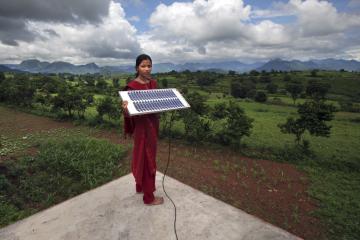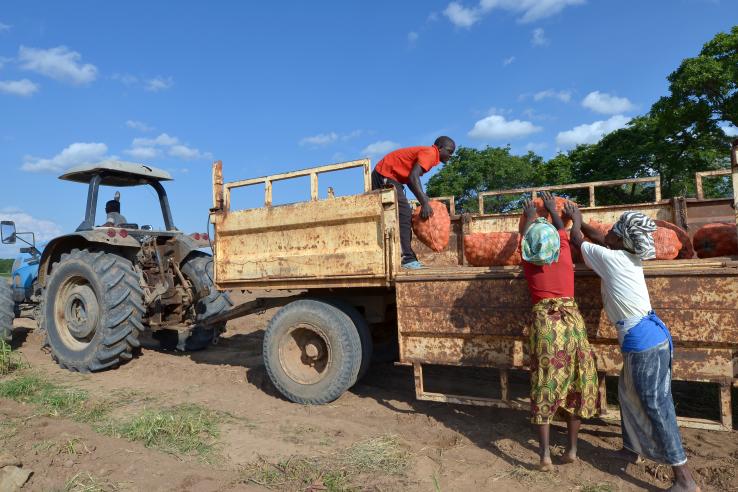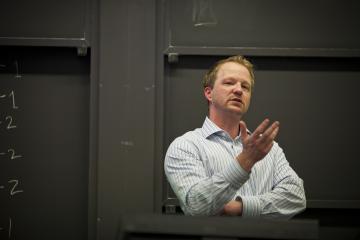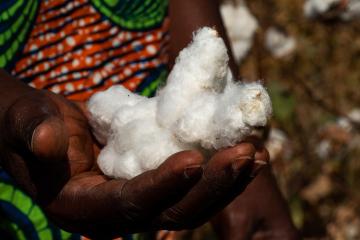
Affiliate Spotlight: Kelsey Jack

To read the full profile, please download the PDF version here.
Kelsey Jack is an associate professor at the University of California, Santa Barbara and serves as a member of the Executive Committee of J-PAL’s Board of Directors and co-chair of J-PAL’s Environment, Energy, and Climate Change sector and King Climate Action Initiative. Through her research, Kelsey is leading a movement of climate-focused research within development economics and poverty alleviation.
J-PAL affiliate Kelsey Jack’s interest in studying the intersection of development and environmental economics goes back to her childhood. While on a family trip at age fourteen, Kelsey saw the hillsides of Madagascar burning. She was witnessing the practice of slash-and-burn agriculture, which involves cutting down and burning vegetation in order to create land for farming.
This experience was pivotal for Kelsey, and the juxtaposition of competing needs has stuck with her to this day. “On one hand, preserving these natural environments that are so unique felt essential, but at the same time, these households needed to feed their families. It was the first time I had encountered a situation where I didn’t have a clear sense of what was right and what was wrong,” Kelsey explained.
Kelsey went on to work for two years in the Lao People's Democratic Republic, gaining hands-on experience working in contexts facing these challenges. Hands-on experience has been a theme in Kelsey’s career. Throughout her extensive experience conducting field research, Kelsey has found her informal conversations with people help shape her research.
On a research project in Zambia, farmers explained to Kelsey that because they only receive harvest income once a year, many households rely on family labor off the farm for income between harvests to help cover consumption needs. This problem was not fully explored by existing economics research, and Kelsey and her coauthors transformed these anecdotes into a multi-year randomized evaluation. “A lot of the inspiration for projects ultimately comes through these more informal interactions, whether with farmers or with policymakers,” Kelsey said.
Kelsey has conducted research with J-PAL for several years, dating back to her time as a post-doctoral researcher with J-PAL and UC Berkeley’s Center for Effective Global Action’s joint Agricultural Technology Adoption Initiative. Kelsey views her experience at J-PAL as having come full circle. In addition to her current roles at J-PAL as a member of the Executive Committee of the Board and co-chair of the Energy, Environment, and Climate Change sector, Kelsey is also co-chair of J-PAL’s King Climate Action Initiative (K-CAI).
Launched in 2020, K-CAI is dedicated to generating evidence and catalyzing the scale-up of high-impact policy solutions at the nexus of climate change and poverty alleviation. Kelsey says the $25 million initiative is long overdue and is hopeful for the impact it will have on the industry at-large. She explained, “It’s a space where there’s such a pressing need for more rigorous evidence.”
By devoting funding to research at the intersection of development and environmental economics, Kelsey hopes K-CAI will steer development economists to consider how climate change will affect their area of study. “One of my biggest goals is to attract researchers who are not necessarily thinking about the relevance of climate to their area of study, whether it’s education, health, or labor markets,” she said. Likewise, she hopes environmental researchers will be encouraged to evaluate how climate change will disproportionately affect poorer populations and low-income countries.
Kelsey noted there is also great potential for K-CAI to help create a movement of evidence-informed climate policy. Here, Kelsey advocates for a shift in thinking among policymakers. “We really need to open up people’s minds to the idea that you can have rigorous evidence and that it’s the right input to decision making.”
Kelsey’s work is motivated by seeking to understand trade-offs and alleviating the barriers households face in aligning their short-term and long-term interests. She explains, “For policy interventions to be effective, you need to understand the decisions that people are making.” This question is key as Kelsey guides a growing body of rigorous evidence and scalable climate solutions through her own research and as co-chair of K-CAI at J-PAL.
Kelsey has been a J-PAL affiliate since 2013. She was a post-doctoral researcher with J-PAL from 2010-2011. For more information about J-PAL and to read about Kelsey’s research, visit povertyactionlab.org/person/jack.
Related Content

New King Climate Action Initiative will design, test, and scale solutions to combat climate change and poverty

Affiliate Spotlight: Christopher Knittel on researching firm and consumer responses to environment and energy policies

